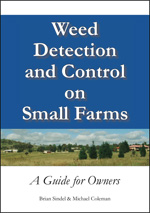A free booklet titled Weed Detection and Control on Small Farms offers crucial guidance for small farm owners struggling to identify and manage weeds on their land. Developed by the University of New England (UNE) in Armidale, NSW, and funded by Land & Water Australia, this booklet is the result of extensive research led by Professor Brian Sindel and his team.
These projects evaluated the ways in which weeds spread across Australia and analyzed detection and control practices used by landholders and weed inspectors. Professor Sindel’s team confirmed that many hobby farmers face greater challenges than professional farmers in managing weeds, often due to limited time, knowledge, or resources.

However, many hobby farmers are eager to enhance their weed management skills, as effective control helps preserve their landscapes and allows them to focus on the rewarding aspects of farming. This booklet aims to harness that enthusiasm by offering straightforward, effective methods for identifying and controlling weeds on small farms.
In Weed Detection and Control on Small Farms, readers will find:
- A clear definition of weeds, their spread mechanisms, and strategies to prevent their spread.
- Practical guidance on weed detection, including where and when to search for weeds, how to identify unknown species, and steps to take if a new outbreak is discovered.
- Accessible control methods for small-scale operations, covering herbicide use, large-scale weed control, and biological management techniques.
- Resources and contacts for further assistance, along with advice on working with neighbors and local weed officers to manage more extensive infestations.
By being diligent and taking early action, hobby farmers can simplify long-term weed control. Professor Sindel emphasizes that weeds pose a significant threat to Australian agriculture and the rural environment. He notes, “Hobby farmers play a vital role in detecting and controlling new infestations, and we hope this booklet empowers both new and experienced farmers to improve their weed management practices.”
To learn more or download a free copy of the booklet, visit here.



